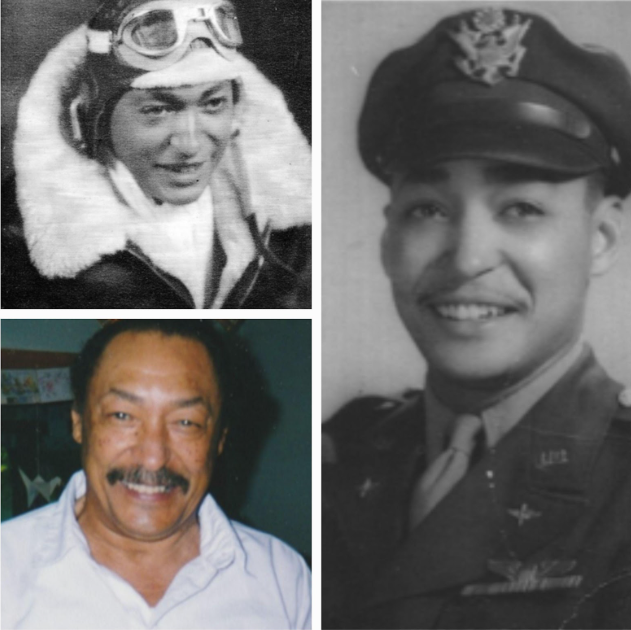
Lt. William Ephraim Broadwater (1926-2015)
Lt. William Ephraim Broadwater January 25, 1926 – September 22, 2015
Bill’s fascination with flying began at age 10 in Bryn Mawr, where he was born. His neighbor, C. Alfred “Chief” Anderson, bought a plane and would land it on a nearby baseball field as Bill looked on. Upon arriving at Tuskegee Institute in May 1944, Bill encountered Anderson, who, as a flight instructor, took him for check rides. After graduating as part of the first Tuskegee class to fly the B-25 bomber, Bill joined the 477th bombardment group at Godman Field, KY, in August 1945.
As it was near the war’s end, the Army Air Corps had less need for pilots, and Bill left active duty as a second lieutenant in March 1946. Returning to Pennsylvania, Bill received his high school diploma and attended Temple University. He bought an Army surplus PT-23 training aircraft for his own use and, in 1948 married Anita Levy. They had two children: William Jr. and Janis, and two grandchildren, Moses Samuel Pinkston, III, and Safiya Broadwater.
After applying for a job as a commercial airline pilot and scoring well on the qualifying test, Bill was not hired, having been given the reason that passengers would not fly with a Black pilot. He then, in 1951, began a distinguished career with Civil Aeronautics Administration (CAA), which in 1957 became the Federal Aviation Administration (FAA). Starting as an air traffic controller, Bill rose through the ranks to become Chief of the Air Traffic Flight Services Division; Chief of the Airspace, Obstruction and Air Traffic Rules Division; and Chief of Air Traffic Accident Investigation and Evaluation Staff. He was also an original member of the U.S. Government Senior Executive Service (SES) and reached the highest level of any Black in the history of the FAA Air Traffic Service Management.
Upon retiring from the FAA in 1980, Bill started an aviation consulting business, leading him to appear as an airspace expert before congressional committees, government agencies, zoning boards, and city councils. He consulted in major U.S cities, including Philadelphia, for procedural requirements for new airport runways. He also conducted airspace studies for tall structures, including approval for the tallest buildings in New York City and Chicago.
Bill was also active in civic activities, including President of a local civic association, president of a Parent-Teacher Association, and member of the Washington D.C. School Superintendent’s Private-Public Sector Steering Committee.
One of the original organizers of the Tuskegee Airmen in the early 1970s, Bill served as the third president of the East Coast Chapter from 1974-1976 and the second National President of Tuskegee Airmen, Inc. (TAI) from 1976-1977. Bill spoke tirelessly about the Airmen’s accomplishments and encouraged youth to pursue careers in aviation. He recruited students for the TAI Youth in Aviation program, which provided flight instruction to high school students and was partly funded from the General B.O. Davis, Jr. Golf Classic, which Bill ran for many years.
On March 29, 2007, Bill joined almost 400 original Airmen in the Capitol Rotunda, where President George W. Bush collectively awarded the Tuskegee Airmen the Congressional Gold Medal. Bill told a reporter, “This day means that we have recognition at the national level, even 60 years later, that we accomplished something important.”
Bill continued flying throughout the years and built up 3000 hours in various aircraft. At age 85, he piloted a B-25 nicknamed “Panchito” out of Sussex County Airport in Georgetown, Delaware. After landing the B-25, he smiled and exclaimed, “It was terrific. The most fun I’ve had in five years – the last time I flew.”
He passed away on Tuesday, September 22, 2015 at the age of 89.



